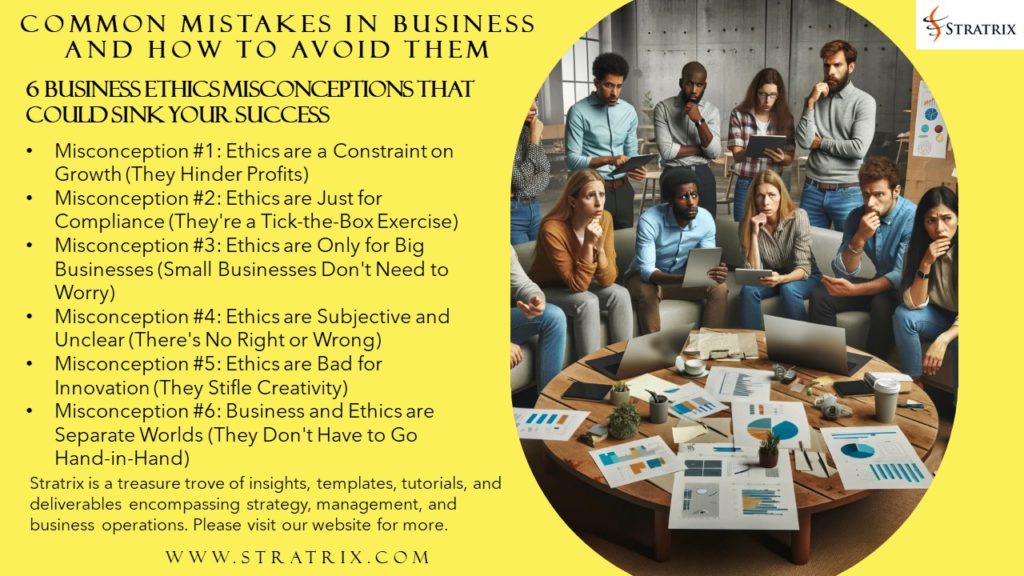6 Business Ethics Misconceptions That Could Sink Your Success
Business ethics. Two words that can conjure up images of dusty compliance manuals and restrictions on profitability. But what if ethical business practices weren’t just the “right thing to do,” but also a strategic advantage? Here are six common misunderstandings about business ethics, debunked, along with a fresh perspective on how ethical conduct can propel your business forward:
Misconception #1: Ethics are a Constraint on Growth (They Hinder Profits)
This is a classic case of short-term thinking. Cutting corners or engaging in unethical practices might boost profits in the immediate future, but the reputational damage from getting caught can be devastating and long-lasting. Consumers are increasingly choosing brands that align with their values.
- New Perspective: Ethical practices build trust and loyalty. By operating with integrity, you attract and retain customers who believe in your brand and are willing to invest in your products or services for the long haul.
Misconception #2: Ethics are Just for Compliance (They’re a Tick-the-Box Exercise)
Compliance with regulations is a baseline, not the finish line. A truly ethical company prioritizes doing the right thing, even when regulations are unclear or don’t apply.
- New Perspective: Ethics are a core value, not a checkbox. Integrate ethical principles into your company culture, decision-making processes, and everyday operations. Empower employees to speak up about potential ethical concerns and create an environment of open communication.
Misconception #3: Ethics are Only for Big Businesses (Small Businesses Don’t Need to Worry)
Regardless of size, every business has ethical responsibilities. Cutting corners on labor practices, environmental sustainability, or data privacy can have serious consequences, even for small companies.
- New Perspective: Ethics are a foundation for sustainable success. Building a reputation for ethical business practices can give you a competitive edge, especially in today’s socially conscious marketplace.
Misconception #4: Ethics are Subjective and Unclear (There’s No Right or Wrong)
While there can be gray areas, most ethical dilemmas have a clear “right thing to do.” Ethical frameworks and codes of conduct can provide guidance, but ultimately, ethical decision-making requires critical thinking and a commitment to doing what’s fair, honest, and transparent.
- New Perspective: Invest in ethics training. Equip your team members with the tools and frameworks they need to identify and navigate ethical dilemmas. Encourage open discussions about potential risks and opportunities, and foster a culture of ethical decision-making.
Misconception #5: Ethics are Bad for Innovation (They Stifle Creativity)
Ethical frameworks aren’t creativity handcuffs. Operating within clear ethical boundaries can actually spark innovation. When you prioritize sustainability, fair labor practices, and responsible data collection, it pushes you to find new and creative solutions that benefit both your business and society.
- New Perspective: Ethics can fuel innovation. Embrace ethical considerations as part of your innovation process. Look for solutions that not only drive profit but also contribute to a positive social and environmental impact.
Misconception #6: Business and Ethics are Separate Worlds (They Don’t Have to Go Hand-in-Hand)
Ethical business practices aren’t just the “right thing to do” – they’re essential for long-term success. Building a strong reputation for ethical conduct attracts top talent, fosters customer loyalty, and positions your business as a leader in an increasingly competitive marketplace.
- New Perspective: Ethics are the foundation of a thriving business. Integrate ethical considerations into every aspect of your business strategy. Embrace transparency, accountability, and a commitment to doing good. By prioritizing both profit and purpose, you can build a business that’s not only successful but also makes a positive impact on the world.
So, ditch the misconceptions and embrace the power of ethical business practices. When you prioritize integrity, fairness, and social responsibility, you’re not just doing the right thing – you’re setting your business up for long-term success.


